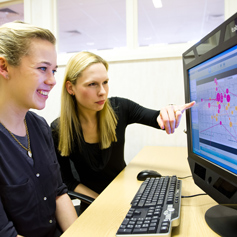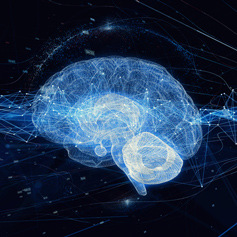
Human centred computing
As technology becomes increasingly ubiquitous, our relationship with it is changing.
Our facilities
We boast an incredible array of facilities, making our innovative human centred computing research possible.
We are treating technology less as a tool, and more as a collaborator. In the move towards more sophisticated automation it is increasingly important that everything we design - from cars to personal assistants to algorithms - has human understanding, behaviour and ethics at its centre.
In the Department of Computer Science, human centred computing researchers are working in diverse fields including healthcare, robotics, virtual reality, media and beyond, to pioneer new forms of technology that will transform our lives, in exactly the ways we want them to.
Areas of expertise
Our researchers focus their work in the following specialist areas:
-
Human computer systems
Understanding how humans use and interact with computing systems is critical, and part of our core mission. We blend expertise in interface design with psychology theories, to build more intuitive computing systems.
Read more
-
Machine learning and robotics
We develop and apply novel statistical Machine Learning methodologies, from theory to application, and push forward the state of the art in Human-Robot interactions with our Cognitive Robotics Lab.
Read more
Postgraduate research projects
Human centred computing projects
- Advising on the Use and Misuse of Collaborative Coding Workflows
- Automatic Activity Analysis, Detection and Recognition
- Automatic Emotion Detection, Analysis and Recognition
- Automatic Experimental Design with Human in the Loop (2025 entry onward)
- Biases in Physical Activity Tracking
- Computer Graphics - Material Appearance Modeling and Physically Based Rendering
- Diabetes Tamagotchi's for Training Clinical Endocrinologists and Diabetologists
- Evaluating Systems for the Augmentation of Human Cognition
- Extending Behavioural Algorithmics as a Predictor of Type 1 Diabetes Blood Glucose Highs
- Generative Artificial Intelligence as a Personalised and Adaptive Bolus Advisor
- How can AI support interaction with complex systems?
- Learning of user models in human-in-the-loop machine learning (2025 entry onward)
- Machine Learning and Cognitive Modelling Applied to Video Games
- Models of Bio-Sensed Body Temperature and Environment as a Refinement of Type 1 Diabetes Blood Glucose Prediction Algorithmics
- Music Generation and Information Processing via Deep Learning
- Pervasive Technology for Multimodal Human Memory Augmentation
- Smart Security for Smart Services in an IoT Context
- Technology-driven Human Memory Degradation
- Understanding the role of the Web on Memory for Programming Concepts
- User Modeling for Physical Activity Tracking
Ke Chen projects
- Automatic Activity Analysis, Detection and Recognition
- Automatic Emotion Detection, Analysis and Recognition
- Biologically-Plausible Continual Learning
- Contextualised Multimedia Information Retrieval via Representation Learning
- Deep Learning for Temporal Information Processing
- Ensemble Strategies for Semi-Supervised, Unsupervised and Transfer Learning
- Explainable and Interpretable Machine Learning
- Generative AI for Video Games
- Machine Learning and Cognitive Modelling Applied to Video Games
- Multi-task Learning and Applications
- Music Generation and Information Processing via Deep Learning
- Zero-Shot Learning and Applications
Sarah Clinch projects
Emily Collins projects
Suzanne Embury projects
Simon Harper projects
- Diabetes Tamagotchi's for Training Clinical Endocrinologists and Diabetologists
- Extending Behavioural Algorithmics as a Predictor of Type 1 Diabetes Blood Glucose Highs
- Generative Artificial Intelligence as a Personalised and Adaptive Bolus Advisor
- Models of Bio-Sensed Body Temperature and Environment as a Refinement of Type 1 Diabetes Blood Glucose Prediction Algorithmics
Caroline Jay projects
Samuel Kaski projects
- Automatic Experimental Design with Human in the Loop (2025 entry onward)
- Collaborative Probabilistic Machine Learning (2025 entry onward)
- Learning of user models in human-in-the-loop machine learning (2025 entry onward)
- Probabilistic modelling and Bayesian machine learning (2025 entry onward)
- Trustworthy Multi-source Learning (2025 entry onward)
Zahra Montazeri projects
Paul Nutter projects
- A New Generation of Terahertz Emitters: Exploiting Electron Spin
- Effective Teaching of Programming: A Detailed Investigation
- Extending Behavioural Algorithmics as a Predictor of Type 1 Diabetes Blood Glucose Highs
- Models of Bio-Sensed Body Temperature and Environment as a Refinement of Type 1 Diabetes Blood Glucose Prediction Algorithmics
- Skyrmionic Devices for Neuromorphic Computing



